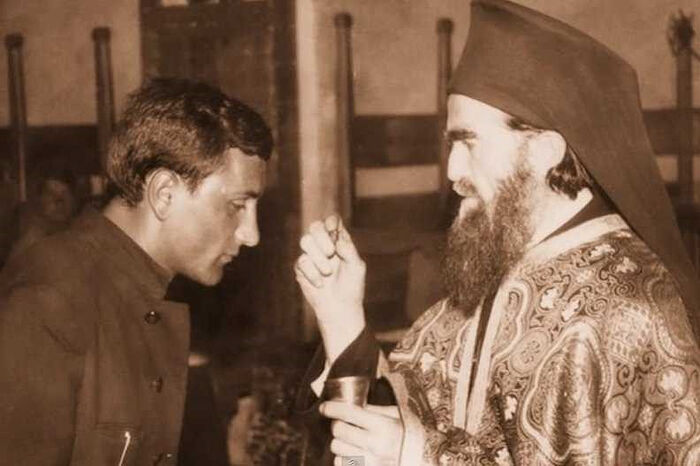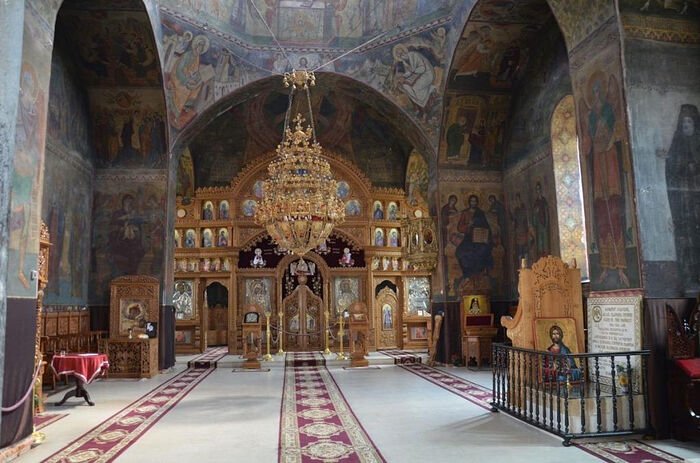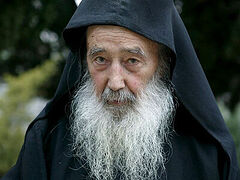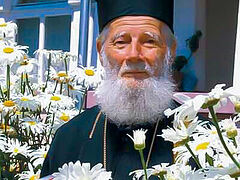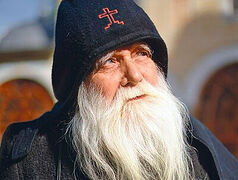Twenty-five years ago, on June 23, 1998, an amazing confessor, full of virtues, the ideal of a meek and humble monk, an unsurpassed hymnographer, Elder Iachint (Unciuleac) of Putna Monastery, whose panegyrics cannot but cause admiration and tender emotion in the hearts of the faithful, reposed in the Lord. Below are the remembrances of one of his spiritual children, who prefers to remain anonymous.
I first met Fr. Iachint in 1983 when I went to Putna Monastery from Sihastria Monastery. Work had just begun on the restoration of the Domneasca House at Putna, and Fr. Iachint was constantly on the move and burdened with cares. And when he would return to the monastery, the laity and the monastery brethren would already be waiting for him, for Confession.
Father told me about several incidents from his life. He wanted to join a monastery immediately after high school. He went to see Fr. Cleopa, but he told him: “Br. Ioan, now is not the time. You have to serve in the army first!”
And he joined the army and there, seeing how savvy and inventive he was, they sent him to flight school. He finished his military training and stayed to finish the school, but not for long; he was expelled because his family was well off.1 This is what he told me about it:
“I was sorry when they sent me to flight school, but I couldn’t refuse, because it was post-war times and there was a need for soldiers. This was an obedience too. When they expelled me I said to myself: ‘And now God is fulling my desire to join a monastery.’”
Then he went to see Fr. Cleopa and was accepted into Sihastria Monastery.
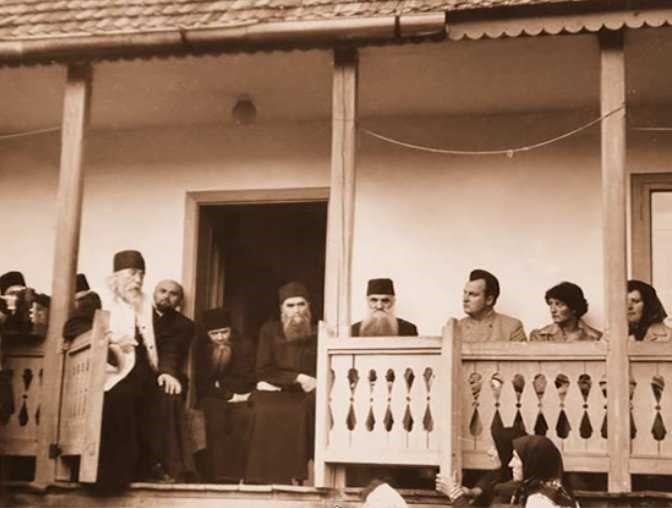 On the veranda of Fr. Cleopa’s cell at Sihastria: Archim. Cleopa (Ilie), Protosinghel Barsanufie (Lipan), Archim. Iachint (Unciuleac), Archim. Ilarion (Argatu)
On the veranda of Fr. Cleopa’s cell at Sihastria: Archim. Cleopa (Ilie), Protosinghel Barsanufie (Lipan), Archim. Iachint (Unciuleac), Archim. Ilarion (Argatu)
A few years later, together with Fr. Cleopa and other monks, he was sent to Slatina Monastery for a period of two years. He was then a disciple of Fr. Sofian (Boghiu) for a year and half, with whom he painted Negru Voda Monastery in Câmpulung Muscel. Meanwhile, the communist regime decided to set up a pig farm in Putna Monastery, and then Fr. Cleopa and several monks from Slatina, including Fr. Iachint, were recalled there to strengthen the Putna brotherhood.
In 1959, the communist persecution against the Church began. Decree No. 410 was issued, expelling the monks and nuns from their monasteries.2 Fr. Iachint managed to escape this fate only because he had graduated from seminary. He was ordained as a hieromonk and confessor, then became the abbot of Putna Monastery, when Fr. Gherasim (Cocosel) was named the Bishop of Arad.
He had a huge responsibility as the abbot and confessor. At that time, in 1983, there were few young monks in the monastery, although Father accepted everyone who came. He didn’t make any choices, saying: “Alright, let them choose themselves; they’ll choose themselves. The place doesn’t keep those who don’t do the things of this holy place.”
Often, when one of the brethren was tempted, Father would send him to the icon of the Most Theotokos saying:
“Go to the Mother of God. Make a few prostrations, and you’ll see the change yourself.”
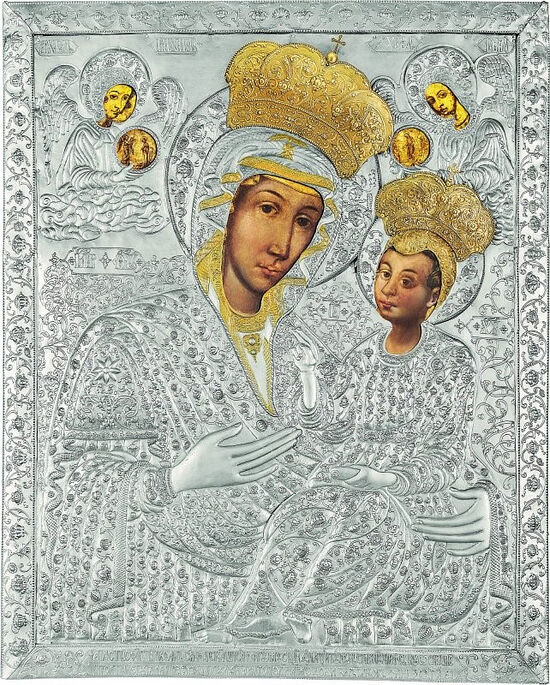 Putna Monastery’s Wonderworking Icon of the Most Holy Theotokos, 1472
Putna Monastery’s Wonderworking Icon of the Most Holy Theotokos, 1472
He always knew how to combine his labors as confessor and abbot. There were few of us, but there were many obediences, and sometimes we complained that we didn’t have time to fulfill our rule and penance. Then he would say:
“Thank God that you live in a monastery. Rejoice that what you do, you do for the glory of God. And think about your brethren, your friends who serve in the world and bear so many sorrows. Is it not enough for you that the Mother of God led you to the monastery to serve here? Rejoice in this and strive as much as you can to fulfill at least part of your rule and penance. And then cross your bed and say: ‘Lord, Thou seest my infirmities, my powerlessness. I am Thine; save me as Thou knowest best!”
This is how Father comforted us.
Whenever someone sinned, he would tell him:
“This is the biggest penance I’ll give you: Think about the fact that you’ve upset God. And try not to upset Him or sin in the future.”
I’ll never forget these words of Fr. Iachint:
“Obedience is sacred! If you obey with love, obedience will never leave you, because it rises to God before prayer.”
I’m grateful to Father for these words, because he encouraged me, and I tried, to the best of my feeble ability, to obey with love.
Fr. Iachint was quite successful in prayer, and his prayer possessed great strength. Those who came to him often didn’t even have the chance to reveal their pain and trouble to him—he’d put his hand on their head, bless them, pray for them, encourage them, then bless their heads with the Sign of the Cross and kiss them on the forehead. And they would soon feel the power of his prayers.
I’m certain that Fr. Iachint possessed the gift of the Jesus Prayer. In Confession, he would ask us:
“Are you fighting with anyone? Has anyone angered or upset you? How is your prayer? Are you fulfilling your obedience with love? Are you saying the Jesus Prayer?”
And he would often give us instructive words about prayer. He reminded me of St. Cyril, the Patriarch of Jerusalem, who, being a patriarch and living among the people, had the gift of prayer. And at the same time, he pastored more than forty metropolitans and bishops and 365 monasteries in Palestine.
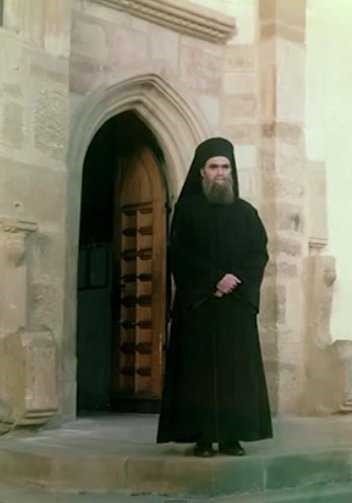 At the entrance of Putna’s Holy Dormition Church
At the entrance of Putna’s Holy Dormition Church
Father would also say:
“If you’re traveling, if you’re at your obedience, if you’re sitting at the table, if you want to lie down to rest, don’t stop saying the Jesus Prayer. It’s the strongest prayer; it alone helps monastics, and they often fulfill their rule by keeping obedience with this prayer.
Having resolved us of our sins, Father would say to each of us:
“Brother, are you sorry that you grieved God? Are you sorry that you saddened your neighbor? Fight back. This is your obedience, your penance: Sin no more; grieve God no more; grieve your neighbor no more. As much as you can, be at peace with everyone!”
And I saw that Fr. Iachint himself truly was at peace with everyone.
“Fight with all your might and pray unceasingly!”
He would tell us that obedience without prayer is bondage, but prayer intertwined with obedience is Liturgy.
He would also ask us in Confession:
“Brother, do you have time to read? Try to read at least one verse before bed.”
He usually advised to read the New Testament and the lives of the saints. He also advised us not to waste time. And we would depart from Confession comforted and elated, inspired and full of new energy to fight temptations.
He was humble, immersed in prayer, silent and patient with everyone. I never saw him agitated or fighting with anyone out of anger or revenge.
Once, when I complained that he had given me a heavy penance, I departed from him saddened. And since the obedience wasn’t beyond my strength, I returned to him and asked for forgiveness and a penance. This is how Father responded to me:
“Father, the abbot must be armed with such patience that even if the whole brotherhood is in turmoil, he must have the strength to calm everyone, knowing that it’s nothing other than the abuse of the evil one.”
That’s how much patience he had. I think this patience wasn’t just some natural trait of his, but a great gift from God.
You would never see him agitated. He would give us a good word at trapeza, and for the laity too. After reading the prayer before Confession, he would give us some instruction that awakened the conscience in people.
Some of the faithful have said that, when out of shame or some other reason, they didn’t confess any sins, Father would listen to them with great patience and ask:
“And didn’t you commit such and such a sin? Didn’t you upset this brother? Didn’t you sin by treating the children unfairly?”
Whoever found themselves before Fr. Iachint could no longer hide their sins.
Father would often say:
“Don’t let the sun set on your anger. As much as you can, be at peace with everyone: with your neighbor, your brother, your sister. If you’re a father or mother, kiss your child before sleep, even if they sinned before you and didn’t ask forgiveness. Don’t let them remain upset!”
Fr. Iachint had a special reverence for the Most Holy Theotokos. He loved her so much that every time he mentioned her, tears would start streaming from his eyes, getting stuck in his beard. He would often say:
“I know that Jesus Christ, to Whom we promised our lives, is the Son of God, but I also know that the Mother of God never ceases to intercede for us.”
He had a custom of commemorating Voivode Stephen in all his prayers, calling him a saint, although he hadn’t been canonized yet.3 He said that the Prince could have paid the Turks tribute for the sake of peace in the court and in the country, but he didn’t want our young men to be taken into slavery, made into janissaries, and to fight against their brothers, and our daughters and sisters to be taken into harems. Voivode Stephen the Great is holy for the sake of the numerous churches and monasteries that he built, that he beautified, to which he granted land, forests, and vineyards.
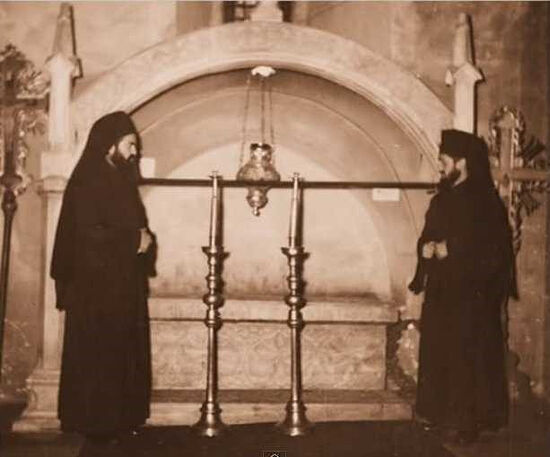 At the grave of St. Stephen the Great, Putna Monastery, 1960
At the grave of St. Stephen the Great, Putna Monastery, 1960
I tell you with pain and tears, I miss Fr. Iachint very much, and since his death, I haven’t found a spiritual father like him. He comforted and soothed us; he cleansed our wounds and applied the proper medicine to them. Sometimes it hurt, but it was short-lived, while the consolation was quick and beneficent.
Father Abbot had another word:
“When you have no one to ask for advice, when you feel like you need Confession but there’s no one around, offer a short prayer and ask God: ‘Lord, is what I want to do now pleasing to Thee?’ and you will immediately learn His will, because God won’t allow anyone who begins a work with prayer to fall into temptation.”
For me, Fr. Iachint is a saint, a chosen one of God, and I have no doubt that he dwells among the saints.
And I ask those who knew Fr. Iachint and lived with him to talk about him as much as they can, to pass on Father’s counsels and teachings and to fulfill them, to serve as a living example for the youth.
Jericho, July 2000

